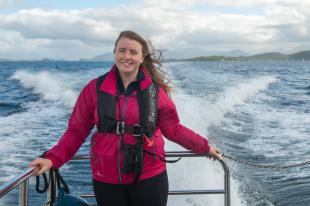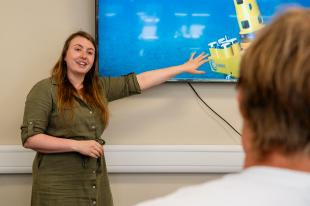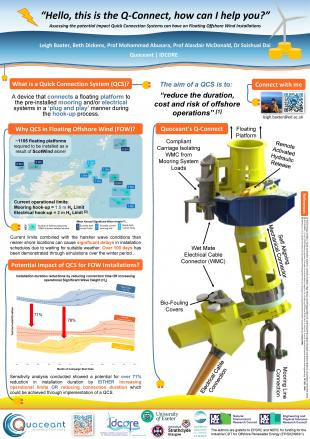Achieving a good work-life balance is an important part of being an effective engineer and leader and IDCORE encourages and supports all its researchers to find this balance.
For Leigh, this is about having the space to participate in synchronised ice-skating – she is part of a team that competes at a high level and she has been encouraged to keep this going both by IDCORE and her project sponsor.
Background
Leigh came to IDCORE as an established engineer with Doosan Babcock in Renfrew. She had a Year in Industry placement with them before starting her first degree, she worked for them each summer while studying, and she returned to them after graduating with a Masters in Electrical and Mechanical Engineering from the University of Strathclyde in 2018.
Working at Doosan Babcock gave her an excellent grounding in engineering with spells in fatigue testing, aerospace, oil and gas infrastructure, structural integrity and, most recently, nuclear power plant outage support. She enjoyed the work but not the focus the company had on fossil fuels.
After volunteering at COP26 she became even more certain that renewable energy was the area she wanted to move into. She found IDCORE while looking for new opportunities, and was attracted by the taught modules and the industry focus of the centre. Not having to apply for a specific project from the start, but being given the chance to find out more about the industry before choosing a sponsor was appealing, as were modules like the ones at Oban that provide wider sectoral context.
Leigh is now working with Quoceant, a marine energy innovation consultancy based in Edinburgh. She was attracted to them by the company culture and the opportunity they provided for ‘hands-on’ involvement in a smaller enterprise than her previous role. They were very supportive of her continuing to ice skate competitively, a reflection of their positive attitude towards work-life balance.
Quote: Beth Dickens, Director, Quoceant
‘Leigh is not the first IDCORE researcher I have supervised. My previous experience, when I worked for PELAMIS, left me knowing that it was something I wanted to do again. It’s been exciting to engage with Leigh and support her as she has developed her project. Our involvement in IDCORE has helped us to develop a far more agile relationship with academia which is vital in such a fast-moving industry.’
Project
Leigh is working on Quoceant’s Q-Connect - a modular and adaptable ‘quick connection system’ for the rapid and safe connection and disconnection of moorings and electrical cables to marine renewable devices in a single operation. It was originally developed for wave and tidal devices but they are currently scaling it up for the floating offshore wind market.
Specifically, Leigh is using JBA Consulting’s ForeCoast Marine software (a simulation tool which was originally developed by previous IDCORE researchers) to quantify the potential for Q-Connect to reduce downtime associated with issues like weather conditions. She is modelling a base case with current installation processes and then exploring the added benefits of Q-Connect.
Some floating offshore wind developers are considering ‘tow-to-port’ maintenance regimes. Q-Connect will clearly provide benefits in these situations, but Quoceant also expect it to be beneficial in other contexts and Leigh’s work is helping them to develop the evidence for this.
Quote: Leigh Baxter
‘The experience I have gained while working with Quoceant and their clients has been invaluable. It has provided unrivalled practical knowledge of what does and doesn't work, and access to industry know-how that you just wouldn't get in a traditional PhD. It’s great to be working in a small company with such a range of knowledge and skills working so closely together.
I’m glad that I made the move to IDCORE. I’m really enjoying being part of the renewables industry, and the IDCORE community …and it’s great to feel supported in continuing with ice skating, the other great passion in my life.’









